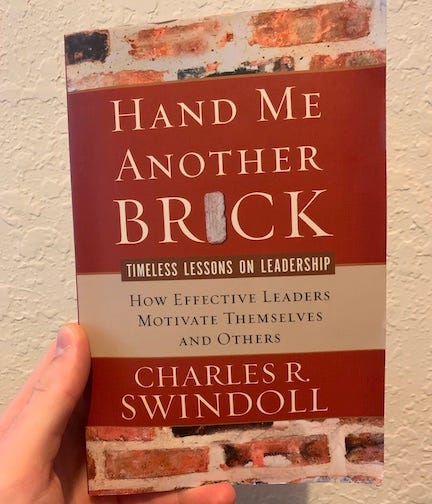Hand Me Another Brick by Charles Swindoll

A good friend of mine, Mignio Lopez, gifted me this book for my college graduation this past May. He’s a great friend of mine and I have been going to Bible study at his house for over a year since we began working together at the Cuban restaurant I used to work at. He told me that he’s read this book in Spanish 3 times. Wow. If he read it 3 times, it needed to be one of the ones that I read. His high praise definitely showed throughout the book as I learned a lot and had a lot of notes.
Right away, even in the intro, Charles centered the book around its purpose. He shared the vision of the book. The vision was to communicate biblical principles of leadership and give readers a greater understanding. Leadership from a spiritual perspective is something that is not taught enough. I agree. Especially with my aspirations, I knew right away, I would want to continue to be present as I read this book and would likely need to stop and talk to God throughout it.
Pg. xii, As a student of the Bible, I continue to uncover more and more truth on this vital subject (leadership). It seems a shame to keep it hidden in my head or tucked away in my files, especially with so little being communicated about leadership from a scriptural perspective.
He shares an interaction with former president Theodore Roosevelt and something he did that shared his views on leadership. This whole book was ultimately a walkthrough of the book of Nehemiah from the Bible. I have not spent that much time in Nehemiah. I had read the book of Nehemiah years ago but not in-depth. I never truly examined who Nehemiah was.
Pg. 4, Throughout his days in office Theodore Roosevelt was either hated or admired. An ardent admirer once exclaimed to him, “Mr. Roosevelt, you are a great man!” In characteristic honesty, he replied, “No, Teddy Roosevelt is simply a plain, ordinary man — highly motivated.” It is safe to say that his answer describes most great leaders, including Nehemiah: plain and ordinary, yet highly motivated.

I highlighted this as a reminder to myself. Life on earth is short. Life in heaven is forever — eternal. People on earth do not need to know who I am, God does, and He already knows, He created me, you, and everyone. It should not matter if people on earth do not give us recognition. They do not have any impact on our eternal destiny — God determines that. And also, as the author shared, our earthly credentials are not important, God has a grand purpose for each and every one of us.
Pg. 22, Nehemiah gave his occupation in verse 11 of the opening chapter: “I was the cupbearer to the king.” That is all we know about his earthly credentials. He was the cupbearer to the king, and he was the son of Hacaliah.
I think that the 4 significant factors that characterize the lives of competent spiritual leaders are so important. Leadership is a way of life. A great difference between a manager and a leader is that one tells people what to do and the other leads by example.
Pg. 24, Marks of a Competent Leader, 4 significant factors that characterize the lives of competent spiritual leaders:
1. A leader has a clear recognition of the needs
It’s remarkable how individuals who have a high level of responsibility often have difficulty relating at the problem level.
2. A leader is personally concerned with the needs
“The worst kids in the world are the church kids.” The church gets the blame. But it’s not a church problem; it’s a home problem. The church can seldom resurrect what the home consistently puts to death.
The higher you are elevated in what the world calls success, the easier it is to fade into theoretical preoccupation and to leave the realistic “lesser things” to work themselves out.
3. A serious leader goes first to God with the need.
I plead with you — as you go before God in prayer concerning any unresolved personal conflicts, take the attitude reflected in these words: “Lord, I bring before you these areas where I have caused an irritation. This is my realm of responsibility. I can’t change this other person. But God, I can tell you that this is my part in it; forgive me.”
4. A leader is available to meet the need himself.
Leaders in God’s work would do well to remember that principle. Prayer is primary — but not theoretical prayer. Prayer that gets the job done includes the conviction, “I’m available, Lord — ready and willing.”
Prayer has become more and more important in my life over the past year. Now, prayer is a vital part of the way that I begin my days, end my nights, and carry on life throughout the day. In the closing of the chapter called, “A Leader — From the Knees Up!” the author shares a few reasons why prayer is so important. I think they all go together. God is our great creator and increased reliance on Him does so much for us. By waiting, clearing our vision, quieting our heart, and activating our faith, not only are we better for it, but we are closer to God also.
Pg. 33, Why is prayer so important? Here are the four shortest reasons I know:
1. Prayer makes me wait
2. Prayer clears my vision
3. Prayer quiets my heart
4. Prayer activates my faith

In this part of the book of Nehemiah, he feels God is calling him to Jerusalem to rebuild the wall. But, he must have the approval of King Artaxerxes as Nehemiah was his cupbearer. So, the author writes that Nehemiah sought the Lord in prayer. All we can do is all we can do, ONLY GOD can change someone’s heart. But, God did just that.
Pg. 36, Because the Lord has the king’s heart in His hand, He literally “causes it to be bent” wherever He is pleased. So putting it all together, the verse could read, “Like irrigation canals carrying water, so is the heart of the king in Yahweh’s hand. He causes it to bend and incline in whatever direction He pleases. Nehemiah sought the Lord in prayer because he knew that was the only way to change the king’s heart.
Action is super important. There is a saying that goes,
“With every blessing comes greater responsibility.”
If we do not show that we are ready for a blessing, why then would God bless us? We must show that we are ready. During the Revolutionary War, the author shared what the soldiers used to say. It’s not enough to simply pray. We MUST take action and prepare.
Pg. 44, The old Revolutionary War soldiers used to say, “Trust in God, but keep your powder dry.” Pray to God, but make your plans, set your sights, think through the obstacles. Many people in God’s work are shortsighted. Imagine Nehemiah’s conversation with the first official outside the province of Susa if he had not planned ahead.
With God, we can do anything. There is, however, a difference between our will for us and God’s will for us.
Pg. 45, Verse 8 concludes with the sentence, “And the king granted them to me because the good hand of my God was on me.”
I love the parable of the 3 servants in the Bible. While their master was away, one turned 5 coins into 10, one turned 3 coins into 6, and the third servant simply buried the 1 coin they were entrusted with. Before the master could trust his servants with more than he already had, they needed to show that they were trustworthy. He wanted to know what they would do with a few coins so he could create expectations for larger things. The same thing happens in nearly every situation, we don’t receive a bonus in anticipation of great things at the office — we get a bonus after we have achieved great things.
“With every new blessing comes greater requirements.”
I think that all 4 principles are especially important and should be consistently practiced, especially in times of difficulty or distress. But, the goal for me is to consistently practice all 4 principles and experience less difficulty and distress as a result. God can move mountains, if we are working for Him, then He can move mountains through us.

The author wrote about someone having a spouse who is ornery. He shares this with the first principle of preparation, we cannot change others. God changes hearts — we don’t. He writes,
Pg. 47, Don’t turn to him or her and say, “I’m just praying for you, Honey, that God will change your life.” That’s the worst kind of manipulation. Just relax; let God take care of it. Then when change comes, guess who gets all the glory?
Four Principles on Preparation:
1. Changing hearts is God’s specialty.
2. Praying and waiting go hand in hand.
3. Faith is not a synonym for disorder or a substitute for careful planning.
4. Opposition is to be expected when God’s will is carried out.
This part made me laugh at first. People always look for the little secrets — myself included. But, there are not always things such as those. God created us to work, He gave us dominion over the earth and everything within it. We need to be up to the task and that requires work, and often, lots of it. God has made it very clear throughout the Bible whom He will bless and why.
Pg. 54, Every once in a while a young man interested in being a pastor will ask me about the secret of a successful ministry. My answer is usually to the point: Do your homework. Be what you ought to be when nobody’s looking. Do the job, and do it to the very best of your ability for the sheer joy of glorifying God in the process. And that requires time in the Scripture!
I love this. This was one of the favorite things I took away from this book. Leaders, equipped leaders, must be able to do both. They must be able to be aware of the situation and not be overwhelmed. They must be able to be aware of the situation and not be discouraged. I completely agree with this. If we get bogged down by details, we are not equipped to lead.
Pg. 55, The individual who is able to stand back — being fully aware of the facts and yet not lost in them — is the one best equipped to lead.
I nodded and nodded and nodded while reading this. I agree. This is what matters. Leaders lead others, not themselves.

Pg. 56, In my Bible, I’ve circled three vitally important words in verse 17: we, us, and we. For Nehemiah to motivate the city planning commission and potential employees, he had to identify himself with the need. When you identify with the problem, you encourage motivation.
Here, the author compared intrinsic and extrinsic motivators. Both are important but intrinsic are stronger, they drive motivation more than extrinsic motivations do. I believe that good leaders are able to understand and identify those motivators for the people they’re leading and ensure that they are all being activated throughout the process.
Pg. 57, Researchers point to several different internal factors that drive motivation, such as challenge, hope, competition, cooperation, and the desire for control or recognition.
Children, especially, need to be rewarded for a job well done because it’s all they may be capable of understanding. However, as we involve ourselves in developing their character, intrinsic motivation should have greater appeal.
To end this chapter, Charles Swindoll shared the key ingredients to success as a leader.
Pg. 62, His (Nehemiah’s) methods included astute observation, careful planning, appropriate timing, savvy motivation, effective communication, and unwavering dedication to a clear vision. Is it any wonder he succeeded?
I agree with the following, there was nothing else for me to add, no response other than thinking to myself that what the author wrote is entirely correct.
Pg. 71, You are never more successful than when you make your plans, advance your cause, and overcome your obstacles on your knees in prayer. The leader who advances on his knees need never retreat.
God never told us it would be easy, but He does tell us that He can get us through anything and everything. Charles Swindoll reminds us that no leader is exempt from criticism so we should not expect to be.
Pg. 75, There are three very practical truths that can be gleaned from Nehemiah 4:
1. It is impossible to lead without facing opposition. The leader must learn to take the heat. Darts will come your way.
2. It is essential to face opposition in prayer. The first response to opposition must be prayer. Prayer is the single, most often overlooked discipline in the Christian life among leaders.
3. Prayer is not all that is necessary if opposition grows. If the leader has prayer and is still facing intensified opposition, he or she must use common sense.
I read this part of the chapter and remembered that there is always an option. There is always a way out. No matter what situation or circumstance we find ourselves in, there is always another option and always a way out.
Pg. 88, How can we deal with discouragement?
1. Unify your efforts toward a goal.
2. Direct your attention to the Lord.
3. Maintain a balance between faith and action.
4. Determine a rallying point.
5. Develop a “serve-one another” mentality.
God deserves all the glory and because the world, and everything in it is His, He can provide us with anything and everything that we need but we need to show that we are trustworthy.
Pg. 99, Don’t miss the promise God attaches to the command (in Deuteronomy 23:19–20), which turns the issue into a matter of faith. In effect, He promised, “If you obey, I will bless you so much more than the interest you would gain by exploiting your brothers.” He wanted His people to maintain such a distinction as would cause a foreigner to stroke his beard and wonder, “Why is that nation so prosperous?” This, of course, would warrant the response, “The Lord, our God, provides our needs without the need to charge each other any interest.”

I next highlighted the 4 fundamental truths that the author shared. These can be applied in any situation when we find ourselves a little offtrack. I was aware of these but loved the way that they were explained. I had the most highlighted about the 3rd thing as I believe that is the one that most people struggle with. We may often want the easy way out, we may not like admitting when we’re wrong, and we might not want to put in hard work to change something that can be reasoned as not that bad anyways.
Pg. 105, How can we put all of this to work for us today? Let me offer four fundamental truths that not only apply to financial integrity, but also to any situation in which you or your organization have gotten off track.
1. God is pleased when we handle our money wisely. Proper money management is important to God. How we earn it, save it, invest it, spend it, and of course, how (or whether) we give it away.
2. Prolonged personal sin takes a heavy toll on God’s work in your life. Sin follows you around like a shadow. If there’s sin in your life, get rid of it! Lay it out before God, or get out of leadership! In Nehemiah 5, you will find no mention of any construction of the wall until the moral house was cleaned.
3. Correcting any problem begins by facing it head-on. We don’t want to endure the pain of reality — and so we hide behind the famous cop-out: “Oh well, nobody’s perfect. You know, that’s just the way I am. Always have been — always will be.” Who says? God is a specialist in the business of changing lives. Claim the power of the indwelling Holy Spirit and say, “God, take over. Change my attitude. I’m sick of this habit. It is sin.”
4. Correction is carried out most effectively when we seal it with a promise, and preferably in public. I would never seek to display a lack of confidence in the Lord. But, it might happen little by little by little by little. I saw a post from Dan Lok recently on Instagram. He asked if we would rather be right or rich. Now, I read a little deeper into that than he explained, rich could mean rich in health, spiritual wealth, etc. Point being, as the author states, if we yield to the intimidation… to preserve HIMSELF. It doesn’t matter what people think of us, why would it? This life is temporary, we should be much more focused on the kingdom.
Pg. 135, Feeling fear is not itself sin, but yielding to the intimidation of God’s enemies in an effort to preserve himself would display a lack of confidence in the Lord. And if the fear were to grow strong enough, it might even cause a good leader to blur the line between right and wrong.
This expands on the part I highlighted on the previous page and my thoughts on it. We all have a mission, it’s not an earthly mission — but a mission from God, a calling. Nehemiah did not respond to the accusations, rumors, or political intrigue unless FORCED to. Society doesn’t quite operate by that same process, do they? With reporters everywhere and people constantly asking questions of people, they know that rumors sell. But, that does not mean we need to respond. Our actions speak for themselves. Or, as the author wrote, Nehemiah allowed the results to speak for him.
Pg. 136, Nehemiah never allowed the rumors and political intrigue to deter him from his mission. I don’t see that he even took the time to respond unless forced to do so. He merely shrugged off the accusations, stayed at his task, focused on the needs of the people, and allowed the results to speak for him.

I thought that the following prayer assessment was very powerful and definitely challenged me. If you’re willing to be honest with yourself, I definitely recommend it. And then, to continue to stay aware of your progress and growth in your faith walk.
Pg. 160, As we approach the topic of prayer, let’s begin with an assessment. Carefully consider the following five questions… but before you do, make a commitment. Commit to telling yourself the honest truth, no matter how uncomfortable it feels. Unless you reveal them, no one will ever know your answers except the Lord.
1. First, are you satisfied with your prayer life?
2. Second, do you pray with confidence?
3. Third, when someone says to you, “Please pray about this,” do you? After three days have passed, are you able to recall the prayer request well enough to follow up with the friend or family member?
4. Fourth, if you were asked to name four or five specific matters you have taken to the Lord in prayer this past week, could you do so without hesitation?
5. Fifth, is your time in the Word of God balanced with time in meaningful prayer?
People are often able to do things. Yet, it’s difficult for many to differentiate between urgency and importance. Also, how many of us truly spend time thinking? It’s said that only 3% have goals that are specific and written down.
Pg. 179, “There are two things that are the most difficult to get people to do: to think… and to do things in the order of their importance.” The degree to which the leader can maintain these two disciplines will determine how well he or she can lead.

We can do whatever we want. But, none of it matters if we don’t know the direction that we are going in. The author included some great questions that should be thought through in all households. In my mind, a husband and wife should have one voice and a well-thought-out approach and strategy to the way that the household is run.
Pg. 181, Here are some questions for the leader of the home should think through:
- What are the goals of the home?
- What is the best way to live and teach Christian convictions?
- Where should we live and why?
- How should the family try to reach neighbors and friends for Christ?
- Why do we want to have children?
- What can we do to help each child become confident and fulfilled?
- Which methods of discipline shall we use?
- What guidelines on teenage dating will we use?
- What guidelines on teenage dating will we follow?
- What do we want to accomplish on our vacation?
- How involved should we be in the church? In civic affairs? In athletics?
- What are our convictions regarding the entertainment media, such as music, television, movies, and video games?
- How shall we cultivate a close relationship as husband and wife?
Nobody would follow a mindless leader, would you?
Pg. 183, Leaders who expect to be respected and followed must, first and foremost, be thinkers.
This chapter was fittingly called, “Putting First Things First” and the author shared some of his practices as a pastor. As he has married hundreds of couples, there are things that he says he requires from each of them before he will agree to marrying them — I totally agree. I think that we must be intentional about our decisions and prepare ourselves for the things that we decide to do BEFORE we actually do them.
Pg. 186, As has been my habit and always will be, I require at least three premarital counseling sessions with a couple before agreeing to marry them. Among other things, I ask them to begin formulating their priorities as a couple. I ask them to write them down, to document their priorities. I then ask them to listen to a tape recording of their ceremony every year when their anniversary rolls around. Hopefully, this annual exercise will reinforce some specifics that will help each couple confirm that they are still on target and what corrections to make if they veered off course.

Now that the author has described different things that leaders do, I made a note of some of the things that an effective leader always does at a personal level. There were 3 things and I think that they’re all important. This was a great way to close the chapter. I love the third part, there was a great quote from Francis Chan in his book Crazy Love where he challenged his readers by asking something along the lines of, “Can someone tell you’re a Christian by the way you live your life?” Christians are called to be distinctly different from others.
Pg. 191, There are some very simple — but life-changing — principles that I glean from these verses in Nehemiah 10.
1. Thought precedes any significant change.
2. Written plans confirm right priorities
3. Where the world is concerned, distinction and conformity pull us in opposite directions.
We are called to live with joy. God gifts us with love and grace and mercy, and as the author wrote, “when you sing, your kids will sing too!”
Pg. 214, Don’t stop singing! Sing this afternoon. Sing on your way home from work. One of the most exuberant expressions of a happy heart is singing. (Glance at Ephesians 5:18–19). I’m impressed with the fact that Nehemiah 12:43 does not say the song was heard from afar. It says, “the joy was heard from afar.” That encourages me! People don’t pay much attention to voices and words, but they cannot ignore genuine, heartfelt joy.
Charles Swindoll closed the comments in this chapter about what great leaders do. While he elaborated on the leader’s ability and requirement to choose our responses and what to focus on, he also challenged us with a few closing questions which I believe are very important. A great leader consistently uplifts those around him or her and these two questions are a great gauge.
Pg. 214, One great application pours out of these verses: Happiness is not dependent on outward circumstances but upon inward choice. When you have chosen to focus on what’s important in any situation, you can smile and sing through an experience and come out rejoicing. It all depends upon what you choose to make your focus.
Do you bring joy to those that you lead?
Is your leadership marked by a good sense of humor?
In closing, the author shares his perspective in regards to the state of the world. I must say that I agree. The Bible makes it very clear what God expects of us, and often, the world in its present state does not reflect God’s wishes. I know that there are people searching for meaning. Recent research suggests that over 35% of the population feels lonely often or always. They’re missing something, clearly. Quite often, I would believe that the need can be filled with a relationship with our wonderful triune God: God the Father, the Holy Spirit, and Jesus.
Pg. 232, Our world has lost its way. It is filled with a fearful and confused humanity. Shepherdless sheep by the millions long for a voice of assurance, a cause to believe in, an authentic model to follow. They seek for someone to calm their fears, to resolve their confusion, to channel their energies. They are calling for strong-minded, warm-hearted leaders. Will you be one of them? If so, you must take life by the throat.

I loved this call to action at the end of the book.
We cannot sit back and wait. We must prepare ourselves. We must pray with expectation and act as if all that God has promised is happening TODAY. What is the use in waiting? There is no purpose of waiting. God will provide all that we need and we must act accordingly.
I gave this book a 4/5